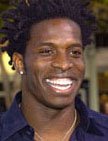Phat Matters
Yesterday, the ladies of the Clit Squad went to view curvy comedienne Mo'Nique's Phat Girlz. Phat Girlz tells the story of Jazmin Biltmore (Mo'Ni
 que), an underemployed department-store clerk (at fictional Bloomfeld's) who dreams of designing her own line of plus-sized fashions and bemoans her lack of dating opportunities. Single, she runs with sororitally-plump but dowdy Stacey (Kendra C. Johnson) and "skinny" cousin Mia (Joyful Drake from Beauty Shop). At a fat-burning-pill-contest-sponsored trip to Palm Springs, she meets Tunde (Jimmy Jean-Louis), a doctor from Nigeria who is in town for a conference. Lust ensues... Meanwhile, Stacey hooks up with Tunde's friend, Akibo (comedian Godfrey), and they promptly start playing doctor in hot, hot (and funny) sex scenes.
que), an underemployed department-store clerk (at fictional Bloomfeld's) who dreams of designing her own line of plus-sized fashions and bemoans her lack of dating opportunities. Single, she runs with sororitally-plump but dowdy Stacey (Kendra C. Johnson) and "skinny" cousin Mia (Joyful Drake from Beauty Shop). At a fat-burning-pill-contest-sponsored trip to Palm Springs, she meets Tunde (Jimmy Jean-Louis), a doctor from Nigeria who is in town for a conference. Lust ensues... Meanwhile, Stacey hooks up with Tunde's friend, Akibo (comedian Godfrey), and they promptly start playing doctor in hot, hot (and funny) sex scenes.While the movie was certainly entertaining, I thought that it was interesting on a number of other levels as well. First, discussions of size were central to the narrative. Like many large people in American society, Jazmin and Stacey can't merely go about their day without thinking about weight. They are dissed at work, at a club, and at FatAss Burger. In Jazmin guise, Mo'Nique's responses to this disrespect are priceless, as is showcased in a verbal throw-down in FatAss Burger. Zingers such as "you are so ugly your mother had morning sickness after you were born" clearly establish her intellectual and comedic superiority. This disrespect resonates with Jazmin's dream of marketing her plus-sized fashions. The plus size section of Bloomfeld's sells the most vomitous, unflattering clothing imaginable (I know this section; I've perused this section and have walked away disgusted.) What's more important, though, is the way that the movie shows the principal characters turning this disgust inward and attempting to overcome it.
Second, issues of size intersect with issues of race. At one point, Jazmin and Stacey decry the fact that skinny white women are taking "all the brothers." In another scene, Stacey asks Jazmin what is "wrong with this picture" as the camera pans to thin white women customers shopping for clothes. Jazmin replies, "We're the only black people in here," but Stacey corrects her, saying, "We're the only fat people in here." The movie maintains this ambivalenc
 e of size-based versus (or in addition to) race-based identification throughout. Many times, Mia is marginalized because she's the skinny "sista" who automatically gets attention from men, but she is nevertheless included in social outings because she is "family." When Jazmin and Stacey are invited to the Nigerian doctors' party, Mia is grudgingly allowed along, though people continually maintain that "she must be sick or malnourished" because of her size. Even so, the movie doesn't propose much cross-racial identification between women of size (except one scene in which white customers become the economic power behind Jaz
e of size-based versus (or in addition to) race-based identification throughout. Many times, Mia is marginalized because she's the skinny "sista" who automatically gets attention from men, but she is nevertheless included in social outings because she is "family." When Jazmin and Stacey are invited to the Nigerian doctors' party, Mia is grudgingly allowed along, though people continually maintain that "she must be sick or malnourished" because of her size. Even so, the movie doesn't propose much cross-racial identification between women of size (except one scene in which white customers become the economic power behind Jaz min's plus-sized clothing line). Here, I think this opportunity isn't developed because of the wealth of material offered by intersections between African-American and Nigerian cultures which seems fitting given the truly multi-cultural investments of writer/director Nnegest Likké (who is at least part Ethiopian).
min's plus-sized clothing line). Here, I think this opportunity isn't developed because of the wealth of material offered by intersections between African-American and Nigerian cultures which seems fitting given the truly multi-cultural investments of writer/director Nnegest Likké (who is at least part Ethiopian).Finally, issues of weight intersect with those of self-confidence and sexuality. Buttoned-up Stacey literally loses those buttons as Akibo rips up all of her resort clothing and proclaims that he "never wants to see her in clothes again" (which makes sense—the woman is gorgeous!). In the throes of love, Jazmin and Stacey find themselves poolside in bathing suits, a place and dress they'd declared verboten at the vacation's start. Though still drawing admonitory stares, they've taken an action which is volcanically freeing for their characters and the movie's viewers alike. You rarely ever see fat people on TV or in movies, and, when you do, they're rarely enjoying themselves. Rock...on...Phat Girlz! Plus, Jazmin's and Stacey's romantic interests are hot, and I
 m
m ean sear-your-flesh-and-seek-medical-attention hot. Haitian Jimmy Jean-Louis makes hottie Djimon Hounsou look like a hobo. And comedian God
ean sear-your-flesh-and-seek-medical-attention hot. Haitian Jimmy Jean-Louis makes hottie Djimon Hounsou look like a hobo. And comedian God frey's none-too-shabby himself (please, someone, give this man my digits). My only concern about these choices for romantic matches is, again, the issue of weight. Though Jazmin and Stacey agonize about their weight, their romantic partners do not have to. Then again, weighter men would have unleashed a weighter narrative and gotten in the way of the Cinderella-type story.
frey's none-too-shabby himself (please, someone, give this man my digits). My only concern about these choices for romantic matches is, again, the issue of weight. Though Jazmin and Stacey agonize about their weight, their romantic partners do not have to. Then again, weighter men would have unleashed a weighter narrative and gotten in the way of the Cinderella-type story.Even though Phat Girlz hasn't necessarily gotten the best reviews, I think it's an entirely worthwile movie. It is, at turns, funny and angry; it tackles myriad social issues; it envisions women's financial, spiritual, and romantic fulfillment; and it features hot, hot guys. At a mere $2 million operating budget, this is a pretty impressive film, and I think Mo'Nique and friends have a lot to be proud of.


1 Comments:
You know, I was also ruminating about the male double standard in the film. There was a "token" fat guy character, but he was a) white and b) didn't serve much function in the plot except to agree with Mo'Nique about "hating skinny girls."
Post a Comment
<< Home